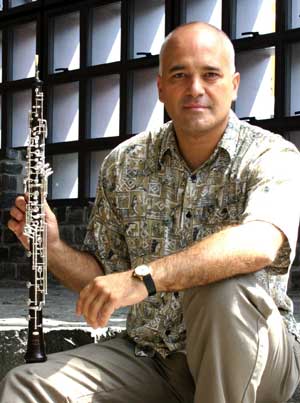Oboist Alex Klein
A Conversation with Bruce Duffie

This conversation with Alex Klein took place in June of 2002, during his all-too-brief term as Principal Oboe with the Chicago Symphony Orchestra. We met backstage at Orchestra Hall, and though our time was limited, the chat was full of serious information and good-hearted laughter. I began by asking a simple but tantalizing question . . . . .
Bruce Duffie: Why the oboe?
Alex Klein: It was peculiar! It was unique; there were not a lot of people playing it in the orchestra. And I was curious as to how can such a big sound came out of such a small opening. I was curious. I looked at it and thought, “This is weird! I want to try that!”
BD: Did you start with oboe, or with something else and then switch?
AK: I started with oboe, but I couldn’t get an oboe. The local teacher in town insisted that I get a good instrument to start off.
BD: Which town was this?
AK: In Cachoeirinha, Brazil. So I started on recorder and ordered a good oboe from Germany that came through the Goethe Institute there. Meanwhile, I would go to my oboe lessons only with a reed! [Both laugh] Every week during my lesson, I would play on my teacher’s oboe, and then go home and practice on the reed only. The poor dogs in the neighborhoods! They just hated it!
BD: So you were working on embouchure, but not on fingering?
AK: Correct. Because oboe is a very difficult instrument to play, the philosophy of the teacher was that if it is already that hard to play under normal circumstances, let’s not make it even harder by starting on an instrument that’s old or broken up. So I got a good, professional instrument right away.
BD: Did you know from the very beginning that you were going to do this for the rest of your life?
AK: Not from the very beginning. I thought it was interesting and cool to do. It took me about two years to come to that realization. Oboe and music filled a void in my life. There were a lot of things I couldn’t do verbally or explain emotionally, and when I started playing music I found a friend. By the time I was eleven, I was already touring and I was soloing. It was very fast. Everything happened very fast.
BD: Was the oboe your friend, or was it the music that you produced from the oboe that was your friend?
AK: The music, but the oboe met my personality. I am stubborn and I am very dedicated to what I do. I enjoy a good challenge, so if I had gotten an instrument that’s easier to play a melody — say a piano or a violin — I would probably not be as satisfied. I needed something to work against, and the oboe proved to be a good challenge. The reed-making and the intonation of the instrument is tricky. All of that needed to be worked on at the same time.
BD: Does the oboe play all of the music that you want to play, or is there more music in your heart so that you wish you were a pianist?
AK: There has always been more music in my heart than the oboe can provide. Almost immediately I started playing music that’s transcribed, so by my mid-teenager years I was already looking into Paganini Caprices and other concertos. I fell in love with a lot of violin music — the Brahms Concerto as well as cello concertos such as the Rococo Variations. The Dvořák Concerto was a favorite of mine since very early on, as were the Tchaikovsky symphonies and Beethoven symphonies. I started conducting when I was ten. I got into conducting also to help fill that void.
BD: So you’re an all-around musician, and not just an oboist?
AK: All-around is a big word! [Laughs] I wouldn’t presume! But I love music as an art in all its forms, from world music to the deepest classical. It’s an avenue for human beings to express emotions that cannot be expressed verbally. It’s not only the classical, but all the way to world music that’s the most non-technical. Classical music is very technical; it has to be played in a certain way to be understood and loved. If you don’t do it well technically, people may not get it. World music is something where the technique doesn’t matter. You can sing any way you want; you can get a matchbox and play some rhythms on it, and it is expression. It is art. So that’s a non-technical music, and it also expresses something that cannot be expressed verbally, and connects people.
BD: So you just want to express what’s in your heart?
AK: Yeah.
BD: When you’re playing other people’s music, are you expressing your heart, or their heart, or both?
